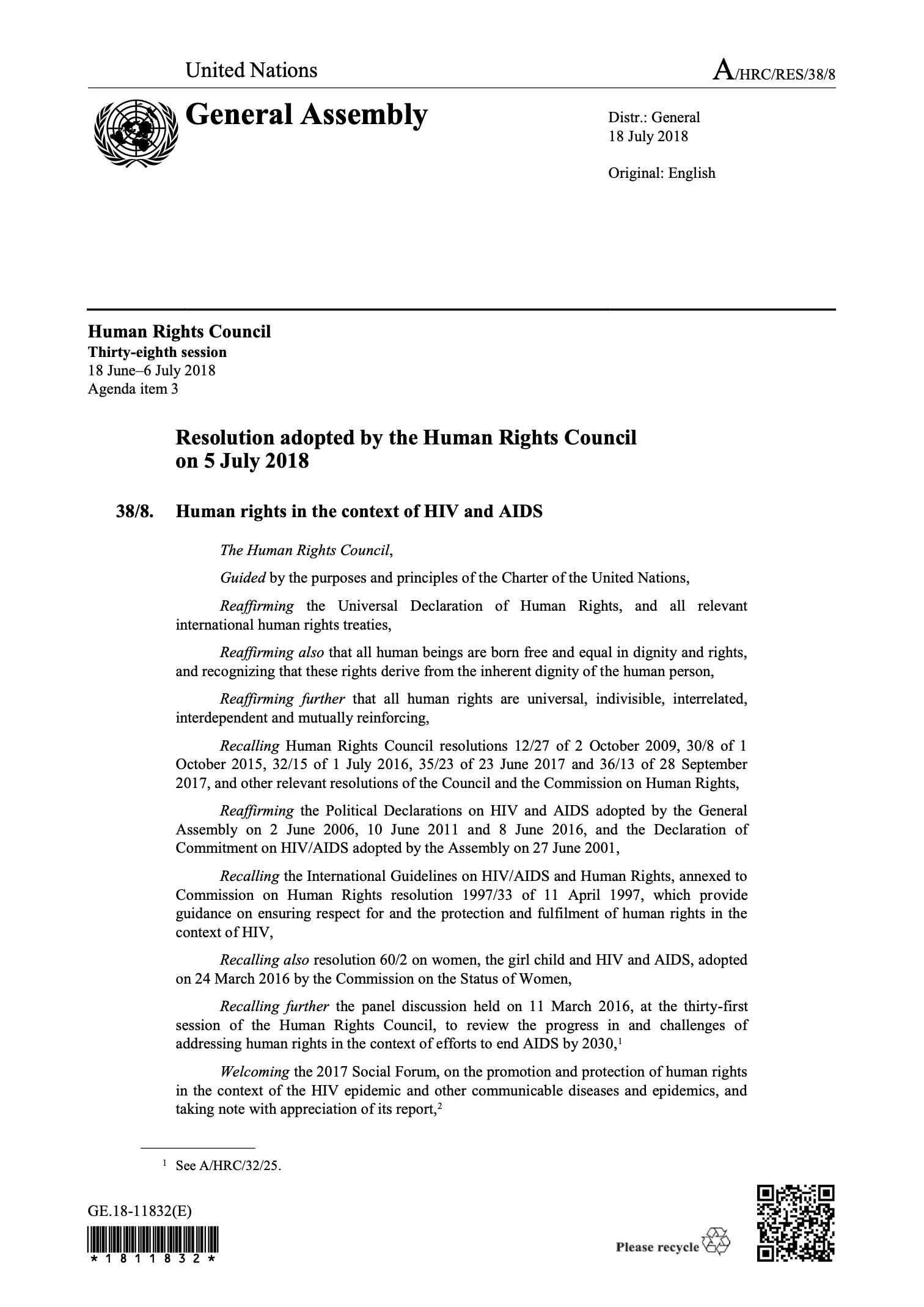2018 HRC Resolution on human rights in the context of HIV and AIDS
Analysis of precedential value
The UN Human Rights Council is composed of elected representatives from 47 Member States; together, they are responsible for coordinating investigations of and responses to human rights violations. This document was co-drafted by representatives of 43 Member States–33 of which were not members of the sitting Human Rights Council–and adopted without a vote.
This resolution was adopted by the General Assembly without a vote in July 2018.
Used as precedent
human rights, universal health coverage
“Affirms that respect for and the protection and fulfilment of human rights in the context of HIV, including universal access to HIV-related prevention, diagnosis, treatment, care and support, are an essential element in achieving the full realization of the right of everyone to the enjoyment of the highest attainable standard of physical and mental health and in ending AIDS.” (paragraph 1)
key and vulnerable populations, stigma and discrimination
“Urges States to ensure full and unimpeded access for all persons living with, presumed to be living with, at risk of or affected by HIV, including key populations, to HIV prevention, diagnosis, treatment, care and support, in a public health environment free from discrimination, harassment or persecution against those seeking HIV-related services, while respecting and protecting their right to privacy, confidentiality and free and informed consent.” (paragraph 4)
human rights
“Urges States to bring their laws, policies and practices, including their strategies for implementing the HIV- and other health-related Sustainable Development Goals, fully into compliance with their obligations under international human rights law, and to review or repeal those that are discriminatory or that adversely affect the successful, effective and equitable delivery of HIV prevention, diagnosis, treatment, care and support programmes for all persons living with, presumed to be living with, at risk of or affected by HIV, including key populations.” (paragraph 5)
“Strongly encourages States, in the context of HIV prevention, diagnosis, treatment, care and support, to provide human rights education and training for health workers, the police, law enforcement officers and prison staff, and other relevant professions, with a special focus on non-discrimination, free and informed consent and respect for the will and preferences of all, confidentiality and privacy, and non-harassment, so as to allow outreach and other service activities and to exchange best practices in this regard.” (paragraph 11)
access to health products
“Reaffirms that access to safe, effective and affordable medicines, diagnosis and treatment for all, without discrimination, in the context of epidemics such as HIV and AIDS, is fundamental to the full realization of the right of everyone to the enjoyment of the highest attainable standard of physical and mental health.” (paragraph 9)
key and vulnerable populations
“Calls upon States to address as a priority the vulnerabilities faced by children affected by or living with HIV, providing those children and their families with social protection, support and rehabilitation, including social and psychological rehabilitation and care, paediatric services and medicines, free from stigma and discrimination, and intensifying efforts to eliminate vertical transmission and to develop and provide early diagnosis tools, child-friendly medicine combinations and new treatments for children, particularly for infants living in resource-limited settings, and building, where needed, and supporting social security systems that protect them.” (paragraph 5)
comprehensive sexuality education
“Calls upon States to accelerate efforts to scale up scientifically accurate, age-appropriate comprehensive education, relevant to cultural contexts, that provides adolescent girls and boys and young women and men, in and out of school, consistent with their evolving capacities, with information on sexual and reproductive health, sexuality and HIV prevention, gender equality and women’s empowerment, human rights, and physical, psychological and pubertal development.” (paragraph 15)
negative legal determinants, stigma and discrimination
“Urges States to address the multiple and intersecting forms of discrimination and the specific health-care needs experienced by migrant and mobile populations, and by refugees and crisis-affected populations, in the context of HIV and to eliminate stigma, discrimination and violence, as well as to review policies related to restrictions on entry on the basis of HIV status with a view to eliminating such restrictions and the return of people on the basis of their HIV status, and to support their access to HIV prevention, diagnosis, treatment, care and support.” (paragraph 19)
